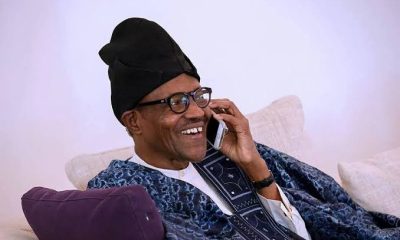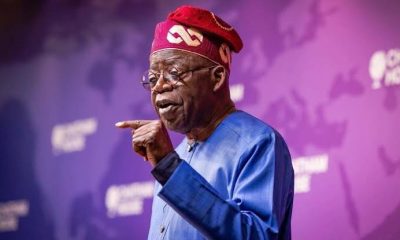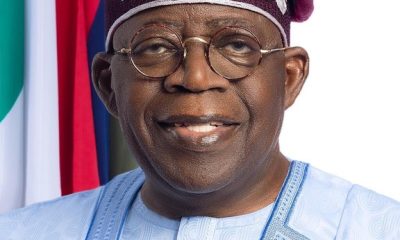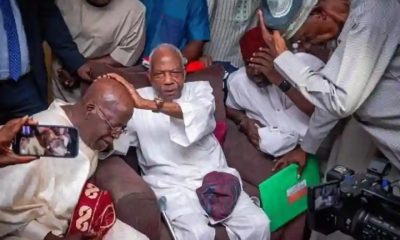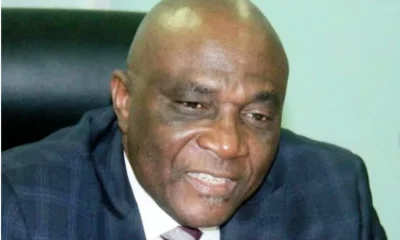News
Mixed reactions greet Tinubu’s broadcast in Kogi
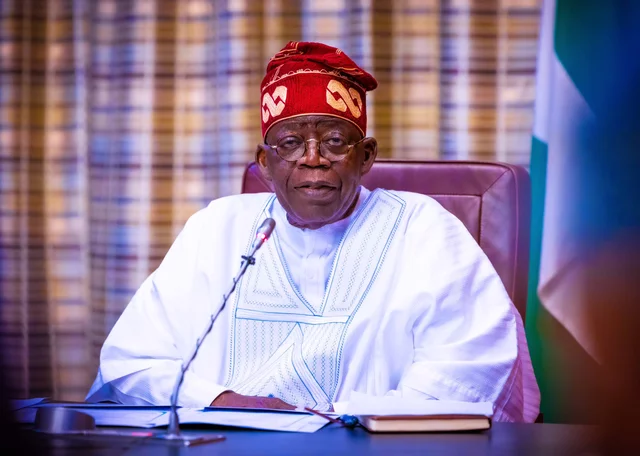
Mixed reactions have greeted President Bola Tinubu’s broadcast with some stakeholders applauding and some berating his policy statements on the nation’s economy.
Prof. Alewo Akubo, the Vice Chancellor of Salem University, Lokoja, told the News Agency of Nigeria (NAN) in Lokoja on Tuesday that aside of “dowsing the tension and anxiety in the hungry and angry citizens”, the speech lacked the desired substance.
Akubo said that the quick manner the president addressed the nation in the face of the biting economic hardship was apt and commendable.
“Unlike the former president Muhammadu Buhari, who hardly bother to address critical national issues on time, Tinubu has shown some level of maturity and understanding of the plights of the citizens.
“What his speech lacked was deliberate and biting actions that could raise the hope of the common man, especially on the comatose refineries and the high price of petrol.
“What most people were expecting was a reversal of pump price of petrol to N540.00 per litre to cushion the effects of the fuel subsidy removal, but to no avail,” he said.
While noting that Nigerians expected actions that can change the hard times without much delay, the vice-chancellor advised the president to throw something tangible on the people rather than promises.
Also speaking, Mr Emmanuel Onoja, the Kogi Secretary of the All Progressives Congress (APC), described the president’s speech as “good” and “straight to the point”.
Onoja praised Tinubu for showing Nigerians and the international community that he is worried over the economic hardship being experienced in the country.
“To me, the speech is a symbol of hope to all citizens looking at the transport, health, education, economic sectors he promised to address their challenges for the good of all,” the APC scribe said.
On his part, Mr Eleojo Opaluwa, the state Vice Chairman, Nigeria Labour Congress (NLC), said that the broadcast was far from the reality of things.
Opaluwa said: “If we carry out a research on the cause of the pain in Nigeria today, it is nothing but the non-functionality of our refineries, leading to the import of refined petroleum products.
“Unfortunately, in Mr President’s speech, there was no where that he made reference to how our refineries can be made to function soon.
“I believe that once we start refining our crude locally, it will force down the price of PMS, and the hardship being experienced by Nigerians, will significantly reduced.
“To sum it all, president Tinubu’s speech has not addressed the real issues,” he said.
Amb. Idris Muraina, the Chairman, Kogi Network of Non-Governmental Organisations (KONGONET), described the national broadcast by the president as an interesting message.
Muraina said that the speech goes to show that he is listening to citizens concerns, which longed for government from local, state and national levels to address.
“Secondly, the contents of the broadcast are strategic and well outlined, only that I have a great deal of concern with the monitoring mechanism that the government will employ.
“The president would have done well to mention names of stakeholders to be engaged to monitor effective and smooth implementation of all the initiatives he outlined.
“It is on record that the past government gave an order for 50,000 tonnes of grains to be distributed across the country as a palliative for COVID-19, which we at the civic space never saw how it went especially at the state level.
“We are always worried that when lofty initiatives of this nature are floated, it always hit the rock at the state and local government levels largely due to poor monitoring mechanism,” he lamented.
Dr Joshua Silas, the branch Chairman, Academic Staff Union of Universities (ASUU), Federal University Lokoja (FUL), said that the president’s speech lacked biting teeth.
Silas noted that the speech was also deficient of concrete actions on some of his (Tinubu’s) policy statements and “therefore fell short of the expectations of Nigerians”.
News
Woman killed while crossing road in Anambra

The Federal Road Safety Corps (FRSC), Anambra State Sector Command, has confirmed the death of a woman in an accident at Okpoko Market on the Asaba-Onitsha Road.
The Sector Commander, Mr Adeoye Irelewuyi, who confirmed the accident to journalists in Awka on Thursday, said that the woman was hit while she was crossing the road.
He said that the accident, which occurred on Wednesday, involved a commercial tow truck with registration number XA550BMA.
“Eyewitness report reaching us indicates that the truck was towing a vehicle in an uncontrollable speed along the axis.
“The vehicle that was being towed got detached from the tow truck.
“It hit and killed a female adult, who was said to be crossing the road, while the tow truck continued its movement.
“FRSC rescue team came to the scene and took the woman to Toronto Hospital, Onitsha, where she was confirmed dead and her body deposited at the hospital’s mortuary,” he said.
While sympathising with the family of the dead, the sector commander urged motorists, especially tow truck drivers, to exercise a high level of professionalism.
He also urged the drivers to always use standard equipment and avoid speeding.
News
LASG’s maize palliative impactful, says poultry association chair

The Chairman, Poultry Association of Nigeria (PAN), Lagos State Chapter, Mr Mojeed Iyiola, said the state government’s maize palliative to members of the association made a positive impact on the sector.
Iyiola said this in an interview with the News Agency of Nigeria (NAN) on Thursday in Lagos.
“We received about 150,000 tons of maize in February from the Lagos State government as palliative to cushion the effect of high feed prices.
“The major benefit of the palliative is that it actually cushioned the cost of production for most poultry farmers in the state.
“The palliative was beneficial as it made the cost of some poultry produce, especially eggs to drop,” Iyiola said.
He noted that prior to the palliative, a crate of egg was sold between N3,500 and N3,700 at the farm gate, but after the palliative, it now sells between N3,200 and N3,400.
According to the PAN chair, retailers and middlemen who sell from N3,800 to N4,200 do that for their personal gain.
“We have urged our members to sell their eggs at reasonable prices following the receipt of the palliative from the government.
“We appreciate the Lagos State government for the palliative but we also urge the federal government to do likewise, to further reduce the cost of production in the sector.
“This will consequently lead to drop in the prices of all poultry produce across board,” he said.
He said the palliative was shared among financial members of the association at no extra cost.
“As an association we shared the grains equally across PAN’s eight zones in the state equally. We also mandated each zone not the sell even a grain of the maize.
“We, however, considered new poultry farmers who wanted to the join the association as beneficiaries of the palliative,” said Iyiola.
He noted that through the palliative, more poultry farmers were recruited into the association.
“The maize was shared only to poultry farmers and not feed millers, it is the major component of poultry feed formulation,” he said.

